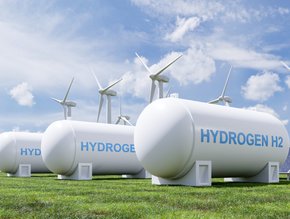Sustainable Ventures: Behind the World’s Leading Startups

There’s no end to the amount of companies globally doing their bit to mitigate their environmental impact and collectively pave the way toward a decarbonised future.
In recent years there has been a surge of climate techs, boasting technologies explicitly focused on reducing greenhouse gas emissions and addressing the impacts of global warming.
Meet Stuart Ferguson, who leads Sustainable Ventures’ investment team. Founded in 2011, Sustainable Ventures is at the epicentre of the climate tech revolution and the largest hub of its type in Europe. It has supported in excess of 500 businesses to scale up from startup to success, including 2022 Earthshot Prize winner Notpla, which makes plastics from seaweed and helping brands like AirEx, which created the world’s first smart air brick to reduce home energy bills, and online clothes selling platform Depop, expand.

With a rich career working across large-scale banks in debt and equity transactions, Ferguson later shifted his focus toward assisting businesses with more than profit at their core. Following time at Lloyds and Royal Bank of Scotland (RBS), Ferguson moved to run an impact fund for Big Issue Invest, part of the wider Big Issue Group which innovates solutions through enterprise to end poverty in the UK.
“I then got more and more interested in climate, recognising what a big challenge it was, and got inspired working by some of the early stage companies,” he shared. And, in the decade since, Ferguson has dedicated his career to working in the early stage climate tech venture space, which eventually brought him to Sustainable Ventures.
What is Sustainable Ventures?
Specialists and developers of early stage climate tech businesses, Sustainable Ventures approaches its support strategy with an ecosystem approach. A place where people, place and community come together, Sustainable Ventures unites expertise and financial backing to help founders with a climate tech business scale considerably more quickly than if they pursued a solo route.
From its office at County Hall in London’s Waterloo, Sustainable Ventures runs shared workspaces with hundreds of startups buzzing under one roof — everything from Genuine Idea Stage Founder to Series B, before passing through and out of the startup phase.
It now has more than 500 climate tech start ups in its ecosystem,
The company is now getting ready to launch its Manchester office, which is part of its short-term plan to roll out across the UK to amass up to 2,000 companies in its roster to solidify its position as Europe's largest climate tech hub.
In Ferguson’s department, Sustainable Ventures invests at a pre-seed stage and already boasts a variety of success stories. Its biggest challenge though is raising more capital to help founders as they continue to develop their business.
Climate tech: An exciting scene to invest in
“It’s a really exciting space for investors right now,” Ferguson said. “Climate change is the number one existential crisis we're facing. It's a huge challenge and there is no one silver bullet to solve it. But, with a huge challenge there's a huge opportunity.
“What we've seen over the last few years is an increased appetite from really clever, smart founders with lots of incredible qualifications coming out and actually wanting to apply that expertise to try and solve climate change. We've seen a huge increase in the number of great technologies and innovations coming through, and it's just incredibly exciting to be part of that and be part of the solution that helps to solve climate change.”
But what’s most exciting, Ferguson believes, is how advancing technology like AI is accelerating the space.
“AI is the buzzword du jour and it really does permeate every sector at the minute,” he said. “There's lots of examples of companies using tech to try and make things much more efficient. I think this is going to be a big year for grid optimisation and grid solutions, a mix of hardware and software starting to bring the grid networks into the 21st century.”

Battery technology, sustainable fuels and wider R&D are also areas Ferguson envisions taking off, with credible commercial opportunities emerging now that haven’t been available before.
“We're about to do our first ever investment in the hydrogen space,” he continued. “This is cool, with alternative materials also being a big deal.”
Sustainable Ventures success stories
With Sustainable Ventures' ecosystem raising £1bn (US$1.26bn) in equity funds to date, the network of startups — supported in this process by Sustainable Ventures — facilitated the creation of more than 5,500 jobs.
“Companies can’t grow without money,” Ferguson highlighted. “Increased investment means increased scale of these companies, and that means increased impact. We've got to be able to find ways of directing more capital into the climate tech space or we're not going to solve climate change.
“But we've also got to recognise this is not just about solving climate change. This is about future-proofing the economy, so it makes commercial sense as well.”
The one common theme Ferguson sees across all of Sustainable Ventures’ success stories is their laser focus on solving real customer problems.
“It frustrates me that probably 50% of the decks we see every year are technology led,” he stated. “They're promoting the features of a technology rather than thinking about how they're going to be applied to a customer. “What needs to happen is focus in on the challenges that you're really good at and you're trying to solve, and you'll be able to scale much more quickly and secure more investment if you're able to see that.”
Rovco was one of the investment arms’ first successes and the first investment it took part in. The company has built unmanned submersible vehicles together with some cutting-edge software technology to map and support the growth of offshore renewable assets. In-house-developed Airex is another climate tech success, which after a long R&D cycle now is up-and-running selling smart energy bricks to house builders, mostly for social housing, to regulates airflow and reduce energy consumption, which Ferguson applauds from a carbon and cost of living perspective.
“While this is a good example of why we are really focused on climate impact, actually there's a lot of other social impact that comes alongside what we do,” he explained.
Stars of the future for Ferguson include Concrete4Change, which has invented a molecule that sequesters carbon uniformly within cement — reducing cement need in concrete and adding a carbon capture element. Among them is Biophilica, which has developed a plant-based alternative to leather and dedicated hardware, AI and robotics engineers Danu Robotics, working to develop recycled waste sorting systems.
*******************
Make sure you check out the latest edition of Energy Digital Magazine and also sign up to our global conference series - Sustainability LIVE 2024.
*******************
Energy Digital is a BizClik brand.






